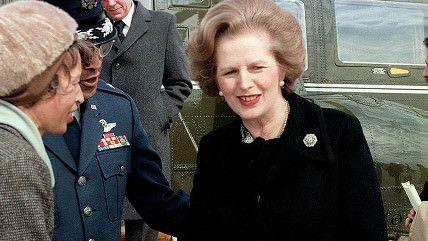Margaret Thatcher Decentralized the British Economy but Centralized Politics


In the hours since Margaret Thatcher passed away there have been the predictable praises and distasteful jeers from conservatives and the left. Unsurprisingly, much of this reaction will be focused on what Jesse has correctly pointed out is a symbolic Thatcher, and not on her actual economic record. While the symbolic Thatcher praised by many conservatives may be more impressive than the real Thatcher she still deserves credit for making valuable reforms to the British economy in the face of fierce opposition. However, while Thatcher may have made important (if sometimes exaggerated) changes to the British economy it is important not to forget that she made changes to British politics that have not been as beneficial as the economic revolution she oversaw.
Reason Foundation's Tom Clougherty mentioned this revolution in his review of Simon Jenkins' Thatcher & Sons when he was back in England working for the London-based Adam Smith Institute:
The first revolution is the one usually associated with the Iron Lady – the liberation of the economy from the unions and the post-war socialist consensus. This revolution saved Britain from being the "sick man of Europe" and made the continued economic growth and prosperity that followed possible.
But it was accompanied by a 'second revolution', which was altogether more malign, consisting of the massive centralisation of power in Whitehall, the destruction of local government, and the rapid proliferation of quangos, regulations, and targets. As the first revolution runs out of steam, the second continues to gain pace. As Jenkins says, our everyday lives are now dictated by central government to an extent that would be unthinkable in most other countries – even 'left-wing' ones.
For those not up-to-date with their Britishms a "quango" is a QUasi-Autonomous Non-Governmental Organization.
So, while those who believe in free markets should applaud many of Thatcher's economic reforms it is important not to forget her other and less impressive legacy, the centralization of much of the political power in the U.K.


Show Comments (112)